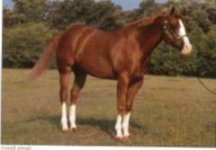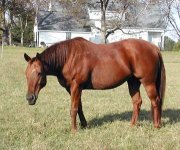♘امیرحسین♞
♘ مدیریت انجمن اسب ایران ♞
The adaptability of the quarter horse breed has allowed it to be used in other occupations such as trail riding and for use by many urban mounted police units. Their even temperament makes them a great animal for new riders learning about horses and their breeding ability has made several stud farm owners both famous and wealthy. It is by far the most popular breed and currently boasts a population of about 3.2 million.
The quarter horse breeds usually shown in competition are larger, more muscular horses with wide jowls. Those for reining and cutting are smaller with more powerful hindquarters very agile and quick on their feet. The show type resembles the running quarter horse though some may be taller and slimmer. All quarter horses however have speed, power and are more than willing to please their owners.
Their popularity also has them working in rodeo and on ranches and as show horses in show and pleasure events.
American Quarter Horse
Their coloring varies from bay, black and brown and includes chestnut, palomino, buckskin and grey. The quarter horse breed is known for its small, short and refined head and straight profile as well as its broad chest and powerful hindquarters. Standing between 14 and 16 hands, about five-feet-tall at the withers, they are bred with two main body types. The stock type, which is more compact and muscular yet extremely agile, and the racing type that may be slightly taller with smoother muscles typically trained for running quarter mile sprints.
History of the Quarter Horse Breed
Back in the late 1700’s the colonists came across a horse breed that combined the English horses with the Chickasaw breed, which was a descendent of the Arabia and Barb, brought into the southeast United States by the Spanish Conquistadors. What they had was a small, sturdy horse that was quick and nimble and showed signs of superior intelligence and a willingness to work. As flat land horse racing became popular, this fast animal, achieving speeds of up to 55 miles per hour over short distances soon dominated the quarter mile track and was aptly named the quarter miler, or quarter horse. As the quarter horse breed continued to gain popularity, its gentle nature led it to be used as a riding horse and due to its strength was soon performing other work on many of the early farms. The breed seemed to have a natural instinct for working around cattle as well. When the settlers began surging west in the 1800’s, the quarter horse breed was the horse of choice of the early cowboys, being used for cattle round-up due to their speed and agile maneuverability and quickly became the horses that cowboys counted on for their daily duties on cattle ranches. As with most activities undertaken by the early cowboys, the duties performed by them and their horses, quickly turned into competition, setting the stage for rodeo riding, and the quarter horse breed excelled at calf roping, team roping and barrel racing. Today, these horses are still in demand for these events
The quarter horse breeds usually shown in competition are larger, more muscular horses with wide jowls. Those for reining and cutting are smaller with more powerful hindquarters very agile and quick on their feet. The show type resembles the running quarter horse though some may be taller and slimmer. All quarter horses however have speed, power and are more than willing to please their owners.
Their popularity also has them working in rodeo and on ranches and as show horses in show and pleasure events.
American Quarter Horse
Their coloring varies from bay, black and brown and includes chestnut, palomino, buckskin and grey. The quarter horse breed is known for its small, short and refined head and straight profile as well as its broad chest and powerful hindquarters. Standing between 14 and 16 hands, about five-feet-tall at the withers, they are bred with two main body types. The stock type, which is more compact and muscular yet extremely agile, and the racing type that may be slightly taller with smoother muscles typically trained for running quarter mile sprints.
History of the Quarter Horse Breed
Back in the late 1700’s the colonists came across a horse breed that combined the English horses with the Chickasaw breed, which was a descendent of the Arabia and Barb, brought into the southeast United States by the Spanish Conquistadors. What they had was a small, sturdy horse that was quick and nimble and showed signs of superior intelligence and a willingness to work. As flat land horse racing became popular, this fast animal, achieving speeds of up to 55 miles per hour over short distances soon dominated the quarter mile track and was aptly named the quarter miler, or quarter horse. As the quarter horse breed continued to gain popularity, its gentle nature led it to be used as a riding horse and due to its strength was soon performing other work on many of the early farms. The breed seemed to have a natural instinct for working around cattle as well. When the settlers began surging west in the 1800’s, the quarter horse breed was the horse of choice of the early cowboys, being used for cattle round-up due to their speed and agile maneuverability and quickly became the horses that cowboys counted on for their daily duties on cattle ranches. As with most activities undertaken by the early cowboys, the duties performed by them and their horses, quickly turned into competition, setting the stage for rodeo riding, and the quarter horse breed excelled at calf roping, team roping and barrel racing. Today, these horses are still in demand for these events


